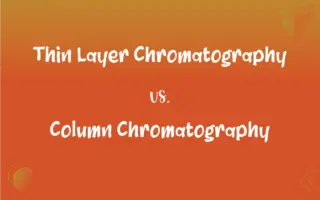Descriptive Research vs. Experimental Research: What's the Difference?
Edited by Aimie Carlson || By Harlon Moss || Updated on October 11, 2023
Descriptive research systematically observes and describes a phenomenon without influencing it, while experimental research involves manipulating variables to understand cause and effect.

Key Differences
In descriptive research, the focus is prominently on elucidating characteristics, features, and specifics regarding its subject matter. It primarily seeks to depict a thorough, accurate profile of the observable elements, carefully presenting the variables as they naturally occur. Conversely, experimental research meticulously engages in altering variables, instituting a controlled environment to astutely evaluate the outcomes of those changes.
Descriptive research steadfastly adheres to capturing the status quo without asserting any alterations to its environment or subjects. This type of research embraces methodologies like observational studies, case-study approaches, and surveys to garner data. Whereas, experimental research delves into systematic exploration through deliberate modulation of variables, intending to unearth potential causational relationships and actively engaging in hypothesis testing.
Through descriptive research, we glean valuable insights into phenomena without pervading their natural progression or occurrence. It's intrinsic in its approach, scrutinizing and narrating occurrences with unaltered authenticity. Alternatively, experimental research persists in its quest to discern how altering a particular variable might invoke change in another, thereby examining plausible causality by manipulating one variable and observing the consequences it bears on another.
Descriptive research embraces the observational method, embodying an unintrusive observer, thereby keeping the natural settings undisturbed and genuine. This methodology draws strength from its ability to provide a lucid snapshot of events as they naturally transpire. On the opposite end, experimental research imposes a methodical intervention in an otherwise natural progression of variables, facilitating the extraction of data that helps in deciphering the symbiotic or consequential relationships between them.
In its essence, descriptive research serves as a potent tool when the intervention is either unethical or impractical, providing a vivid portrayal without any contamination of external influence. Contrastingly, experimental research, with its capability to manipulate variables, allows researchers to traverse beyond mere associations and delve into establishing definitive cause-and-effect relationships between the studied variables.
ADVERTISEMENT
Comparison Chart
Purpose
Observes and describes phenomena without influencing them.
Investigates causal relationships by manipulating variables.
Intervention
Does not involve any intervention or manipulation of variables.
Actively involves manipulation of one or more variables.
Cause-and-Effect Relationship
Does not establish cause-and-effect relationships.
Aims to establish cause-and-effect relationships.
Control over Variables
No control over variables; observes them as they are.
Maintains strict control over variables, manipulating them.
Research Setting
Can be conducted in a natural setting.
Usually requires a controlled setting to manage variables.
ADVERTISEMENT
Descriptive Research and Experimental Research Definitions
Descriptive Research
Descriptive research often utilizes methods such as surveys, observations, and case studies to gather data.
Using a survey, the descriptive research gathered comprehensive data regarding consumer preferences.
Experimental Research
This type of research deliberately creates a controlled environment to explore causation between variables.
Experimental research in psychology often involves creating scenarios to understand behavioral impacts.
Descriptive Research
It usually refrains from manipulating variables, ensuring the authenticity of the observed data.
Descriptive research on student behavior focused on observing genuine interactions without interference.
Experimental Research
Experimental research utilizes various controlled experiments to validate or refute a hypothesis.
In experimental research, the medical team administered various drug dosages to ascertain their efficacy against the disease.
Descriptive Research
Descriptive research aims to accurately portray characteristics and specifics of a phenomenon.
The study meticulously detailed the daily behaviors of the endangered species without intervening.
Experimental Research
Experimental research actively manipulates one or more variables to observe their effect on other variables.
The scientists engaged in experimental research by altering light levels to observe their impact on plant growth.
Descriptive Research
It solely observes and reports the findings without altering any variables within the study.
The sociologist engaged in descriptive research to candidly observe urban migration patterns.
Experimental Research
It typically involves forming a hypothesis that gets tested through manipulated experiments.
Experimental research on sleep patterns necessitated the adjustment of participants' sleep schedules to observe effects on cognition.
Descriptive Research
This research method seeks to present a snapshot of events or phenomena exactly as they naturally occur.
Through observational descriptive research, the team provided an unbiased depiction of wild animal migration patterns.
Experimental Research
Experimental research seeks to establish a cause-and-effect relationship through controlled conditions.
By adjusting dietary inputs in experimental research, the researchers explored effects on animal weight gain.
FAQs
What is the primary goal of descriptive research?
To observe and accurately describe the characteristics of a phenomenon without influencing it.
What role does hypothesis testing play in experimental research?
A crucial role, as hypotheses are formulated and tested through controlled experiments in experimental research.
In what scenario is experimental research most beneficial?
When researchers seek to understand the causational relationship between variables.
How does experimental research establish causality?
By manipulating one variable and observing the impact of that manipulation on another variable.
Which research type explores cause-and-effect relationships?
Experimental research.
Can descriptive research be conducted in natural settings?
Yes, descriptive research often occurs in natural, uncontrolled settings.
What are some common data collection methods in descriptive research?
Surveys, case studies, and observational studies are common.
Is intervention a part of descriptive research?
No, descriptive research does not involve any intervention or manipulation of variables.
How does variable control differ between descriptive and experimental research?
Experimental research often involves strict variable control and manipulation, unlike descriptive research.
Can experimental research be conducted without manipulating variables?
No, manipulation of variables is fundamental to experimental research.
Can experimental research validate hypotheses?
Yes, it actively seeks to validate or refute hypotheses through experimentation.
What is a potential limitation of descriptive research?
It cannot establish cause-and-effect relationships due to the lack of variable manipulation.
Can experimental research be conducted in a natural setting?
While it can, it often requires controlled conditions to accurately test hypotheses and observe variable impacts.
Can descriptive research establish cause-and-effect relationships?
No, it primarily observes and describes phenomena without determining causality.
Is survey a method employed in experimental research?
While surveys can be used, experimental research often leans more towards controlled experiments.
Are results from descriptive research generally generalizable?
Often not, as it typically focuses on specific situations or groups without variable control.
What is a key benefit of the controlled conditions in experimental research?
They allow researchers to isolate variables and accurately determine causational relationships.
What distinguishes the environments for descriptive and experimental research?
Descriptive often occurs in natural environments, while experimental typically requires controlled settings.
What kind of research design does descriptive research usually involve?
It often employs observational, survey, or case-study designs.
Is a controlled environment crucial for descriptive research?
No, descriptive research doesn’t necessitate a controlled environment.
About Author
Written by
Harlon MossHarlon is a seasoned quality moderator and accomplished content writer for Difference Wiki. An alumnus of the prestigious University of California, he earned his degree in Computer Science. Leveraging his academic background, Harlon brings a meticulous and informed perspective to his work, ensuring content accuracy and excellence.
Edited by
Aimie CarlsonAimie Carlson, holding a master's degree in English literature, is a fervent English language enthusiast. She lends her writing talents to Difference Wiki, a prominent website that specializes in comparisons, offering readers insightful analyses that both captivate and inform.




































































